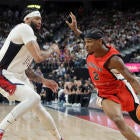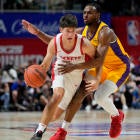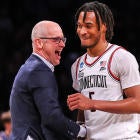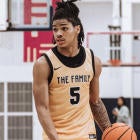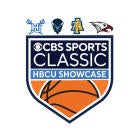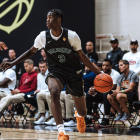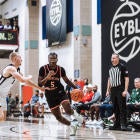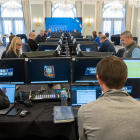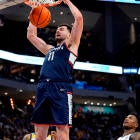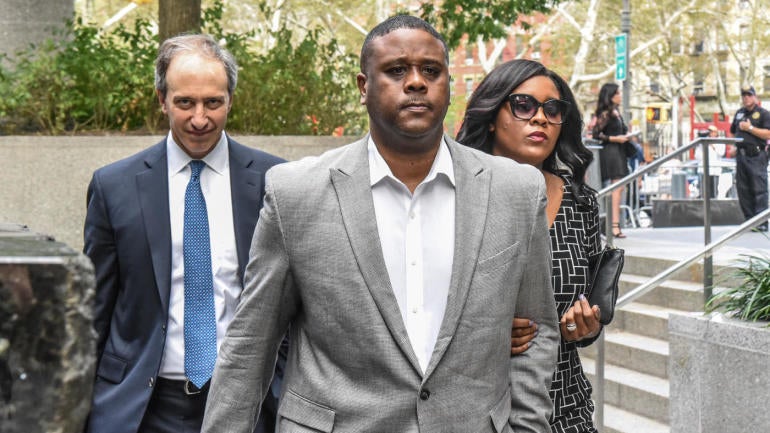
The federal government got its wins. Again.
Now the NCAA can officially commence with its own review on the matter of prominent corruption in college basketball recruiting. You can bet a lot more people will have even more emotional investment in those Indianapolis tribunals than the pair of trials that took place in Lower Manhattan and bookended the 2018-19 college basketball season.
On Wednesday, the second trial detailing college basketball criminality wrapped, with defendants Merl Code and Christian Dawkins again getting guilty verdicts tagged on them. The two had previously been found guilty for separate charges, all relating to fraud, back in October.
It wasn't a clean sweep, though. Dawkins was found guilty on Wednesday of two of the six charges levied against him; Code had just one of his four charges stick. Both were found guilty of conspiracy to commit bribery, while Dawkins also was found guilty of bribery. (Dawkins and Code were cleared of honest services fraud, wire fraud and conspiracy to violate the travel act.) The verdicts emanated from charges that the men were conspiring to steer college prospects and players, once they turned pro, to Dawkins' embryonic business management company.
Combine the cross-trial guilty verdicts with guilty pleas from four college basketball assistants (USC, Oklahoma State, Arizona, Auburn), the flipping of others charged and, on Tuesday, the final guilty plea from an NBA referee-turned-clothier, Rashan Michel, and the U.S. Attorneys Office in the Southern District of New York came away looking good and strong.
In basketball parlance: Scoreboard.
The ultimate results fall well short of the pomp and promises made back on Sept. 26, 2017, when this investigation was revealed, 10 arrests were made and federal investigators' hue and cry over catching big fish in college basketball's murky pond seemed achievable if not inevitable. That didn't happen, though. No other arrests ever came. Nevertheless, nine of the 10 initially charged in the case wound up guilty (the only exception being a grassroots coach, Brad Augustine, who had his charges dropped in February 2018 after he proved he never bribed anyone with federal money -- because he pocketed the cash for himself).
A vast investigation that took years, involved millions of dollars worth of resources and resulted in a pair of high-profile federal trials brought a lot of controversy, information, allegations, evidence and testimony against those in and around college basketball.
But the truth is the general public didn't much care about the verdicts of this trial or the first one because the defendants involved weren't high-profile. Even the assistants from big-time universities, who will be sentenced later this month, weren't known to 99 percent of diehard college basketball fans. It was never about the low-level defendants. It was about the high-profile head coaches and the schools that employed them.
These trials, this FBI investigation, all of the curiosity generated therein came from a combo of schadenfreude and anxiety on behalf of fan bases invested in seeing if their programs would get pinched or how hard their rivals might get nailed. The public was more interested in the juicy details -- who could get exposed -- and the accusations and greasy evidence over how coaches cheated, were willing to cheat or conspiring to potentially cheat. (For those thinking Bruce Pearl might have his Sean Miller moment, it will not happen. With Michel pleading guilty, along with former Auburn assistant Chuck Person, it ensures further discovery and exposure to Auburn will be dodged thanks to the now-nixed trial.)
Before the start of each trial there was nervousness and intrigue over what information would come out, what head coaches' conversations -- if any -- would be played on wiretap or if said coaches would have to take the stand. Turns out the answer to that all of that was zero.
That almost certainly won't absolve Miller, who had Book Richardson, his longtime assistant at Arizona, caught on video accepting $20,000 to recruit players for Dawkins, fund recruitments of prospects to Arizona and boasting about how he could influence -- if not outright instruct -- Arizona's players on what they would do after leaving school.
Wednesday's closing of The United States vs. Christian Dawkins and Merl Code means that, as of May 8, 2019, NCAA enforcement is officially on the clock. And while the guilty-or-not verdicts didn't mean much to outsiders, the fact that separate juries came to similar conclusions in two cases, it puts all the more impetus on the NCAA to mete out punishments. It provides some validity to whatever sanctions it has coming for coaches and schools.
The United States judicial system played out, brought guilty verdicts on multiple fronts, and that is damning for college basketball even if you disagree with the merits of the cases or what either jury decided to do.
The NCAA specifically made alterations to its enforcement structure to allow evidence and testimony from trials to be used in its own investigations. You have coaches from Arizona, USC, TCU, Oklahoma State, Creighton, Kansas, Louisville, Alabama, Clemson, UConn and plenty more caught on wiretap or video -- or through government-witness testimony -- discussing or acting out NCAA violations.
Plenty of those coaches are no longer at those schools. Some don't even currently have jobs. How will the NCAA handle all of these cases? The violations vary; allegations of other acts of rule-breaking were never proven in court. Will the NCAA have the ability to uncover more? That's going to be difficult; a lot of players whose recruitments were alleged to be shady have already moved on from college. They have no obligation to ever talk to the NCAA and almost certainly never will -- not to mention the possibility the players didn't know the full extent of what was happening around them to begin with.
So that leaves the enforcement division in Indianapolis with an unrivaled challenge -- and everyone's going to be waiting to see how all of this is sorted out. From Sean Miller to Will Wade, from Kansas to USC to Arizona and at least a dozen other schools in between, who's going to get hit? How hard? And when?
Don't expect anything until 2020 at the earliest. The wheels of NCAA justice notoriously revolve at a turtle's pace, and with so many colleges ensnared in this, it's unrealistic to expect adjudication before the start of the 2019-2020 season.
Whenever NCAA verdicts are determined, one word of advice to NCAA president Mark Emmert, the Committee on Infractions and all others who will have their hands touching these cases: release the results of the investigations in the same relative portion on the calendar. You can't be sanctioning one school in February 2020, another three months later and five more that December. It would be illogical.
Phase One of this saga is done. On Wednesday, the feds came away with the wins they banked on a year and a half ago. And now the NCAA is going to try to match, if not one-up, the Southern District of New York. Because no matter the widespread federal resources that were committed to this unprecedented investigation, the NCAA and its member schools have a lot more invested than the millions the government put up to expose college basketball's erratic black market.
There are a lot more than nine people who are guilty in all of this, and you better believe the NCAA will be hellbent on trying to prove that in the months if not years to come.









